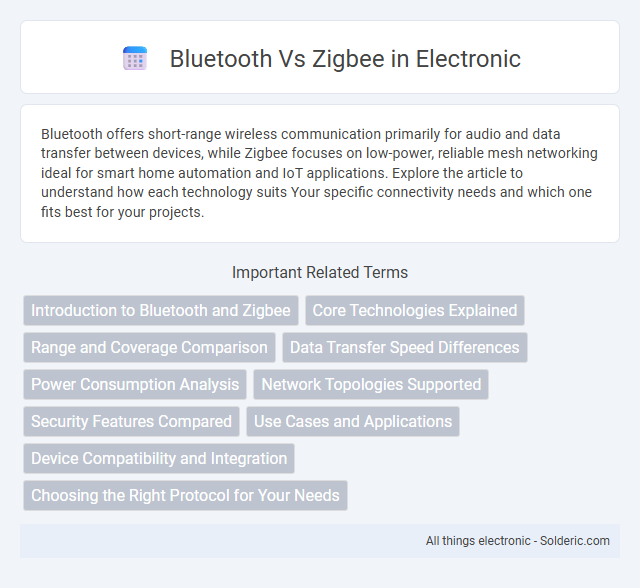Bluetooth offers short-range wireless communication primarily for audio and data transfer between devices, while Zigbee focuses on low-power, reliable mesh networking ideal for smart home automation and IoT applications. Explore the article to understand how each technology suits Your specific connectivity needs and which one fits best for your projects.
Comparison Table
| Feature | Bluetooth | Zigbee |
|---|---|---|
| Range | Up to 100 meters | Up to 100 meters (can extend via mesh network) |
| Data Rate | Up to 3 Mbps (Bluetooth 4.0+) | 250 Kbps |
| Power Consumption | Low (optimized for battery devices) | Very Low (designed for low power IoT devices) |
| Network Topology | Point-to-point, star | Mesh, star, tree |
| Use Cases | Audio streaming, file transfer, wearable devices | Home automation, sensor networks, industrial control |
| Frequency Band | 2.4 GHz ISM | 2.4 GHz ISM |
| Security | AES-128 encryption | AES-128 encryption |
Introduction to Bluetooth and Zigbee
Bluetooth and Zigbee are wireless communication protocols designed for short-range connectivity, with Bluetooth widely used in consumer electronics for audio, file transfer, and personal device networking. Zigbee is optimized for low-power, low-data-rate applications such as home automation and industrial control, providing reliable mesh networking capabilities. Your choice depends on whether you need high data throughput or energy-efficient, scalable device networks.
Core Technologies Explained
Bluetooth uses short-range radio waves operating in the 2.4 GHz ISM band to enable device pairing and data exchange with a focus on streaming audio, file transfer, and peripheral connectivity within personal area networks. Zigbee relies on low-power, low-data-rate wireless mesh networking technology also in the 2.4 GHz band but optimized for IoT applications requiring energy efficiency and secure, reliable communication between numerous devices over larger areas. Your choice depends on whether you prioritize high throughput and direct device communication (Bluetooth) or scalable, battery-friendly device networks (Zigbee).
Range and Coverage Comparison
Bluetooth typically offers a range of up to 100 meters with Bluetooth 5.0, making it suitable for personal area networks and short-distance communication. Zigbee boasts an extended range of up to 200 meters per hop and supports mesh networking, allowing it to cover larger areas through repeaters. Your choice between Bluetooth and Zigbee should reflect the required coverage area and network scale for optimal connectivity.
Data Transfer Speed Differences
Bluetooth offers significantly higher data transfer speeds compared to Zigbee, with Bluetooth 5.0 reaching up to 2 Mbps, while Zigbee typically maxes out at 250 Kbps. This difference makes Bluetooth more suitable for applications requiring rapid data exchange, such as audio streaming or file transfers. Your choice depends on whether speed or low power consumption for simple sensor data is the priority.
Power Consumption Analysis
Bluetooth Low Energy (BLE) typically consumes more power than Zigbee during active communication but offers efficient sleep modes that extend battery life in intermittent use cases. Zigbee excels in low power consumption for continuous, low-data-rate transmissions, making it ideal for sensor networks and smart home applications with extended battery longevity. Both protocols optimize power differently, with Zigbee favoring energy efficiency in mesh networks and BLE balancing connection speed and power savings for personal devices.
Network Topologies Supported
Bluetooth primarily supports star and mesh network topologies, ideal for point-to-point and small-scale device communication, while Zigbee excels with mesh, star, and tree topologies, enabling robust, scalable networks for smart home and industrial IoT applications. Zigbee's mesh topology allows devices to relay data through multiple nodes, enhancing range and reliability, which is crucial for extensive sensor networks. Your choice depends on whether you prioritize Bluetooth's ease of use in personal area networks or Zigbee's flexibility in creating large, self-healing networks.
Security Features Compared
Bluetooth employs advanced encryption standards such as AES-128 to ensure secure device pairing and data transmission, incorporating frequency hopping to prevent eavesdropping. Zigbee also uses AES-128 encryption but emphasizes network-level security with centralized Trust Centers managing device authentication and key distribution. Both protocols support secure communication; however, Zigbee's hierarchical security model is designed for mesh networks, while Bluetooth focuses more on point-to-point security in personal area networks.
Use Cases and Applications
Bluetooth excels in short-range, high-bandwidth applications such as wireless audio streaming, smartphone peripherals, and file transfers, making it ideal for consumer electronics and personal devices. Zigbee shines in low-power, low-data-rate scenarios like home automation, smart lighting, and industrial sensor networks, where battery life and mesh networking are crucial. Your choice depends on whether you need rapid data exchange or long-term, energy-efficient connectivity for IoT applications.
Device Compatibility and Integration
Bluetooth offers broad device compatibility, integrating seamlessly with smartphones, tablets, and laptops, making it ideal for personal area networks and consumer electronics. Zigbee excels in connecting a wide range of IoT devices, including sensors and smart home products, due to its mesh network capabilities and low power consumption. Your choice between Bluetooth and Zigbee depends on the specific ecosystem you want to build, with Bluetooth favoring everyday gadget compatibility and Zigbee supporting scalable, energy-efficient device integration.
Choosing the Right Protocol for Your Needs
Bluetooth offers widespread compatibility and high data transfer rates, making it ideal for audio streaming and short-range device connections. Zigbee excels in low-power consumption and mesh networking capabilities, suited for smart home automation and sensor networks requiring extended battery life. Understanding your specific use case, such as range, power efficiency, and network topology, will guide you in choosing the right protocol for your needs.
Bluetooth vs Zigbee Infographic

 solderic.com
solderic.com